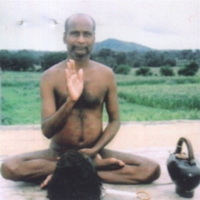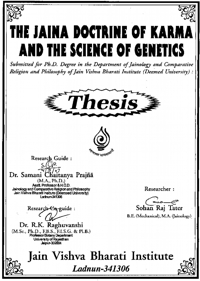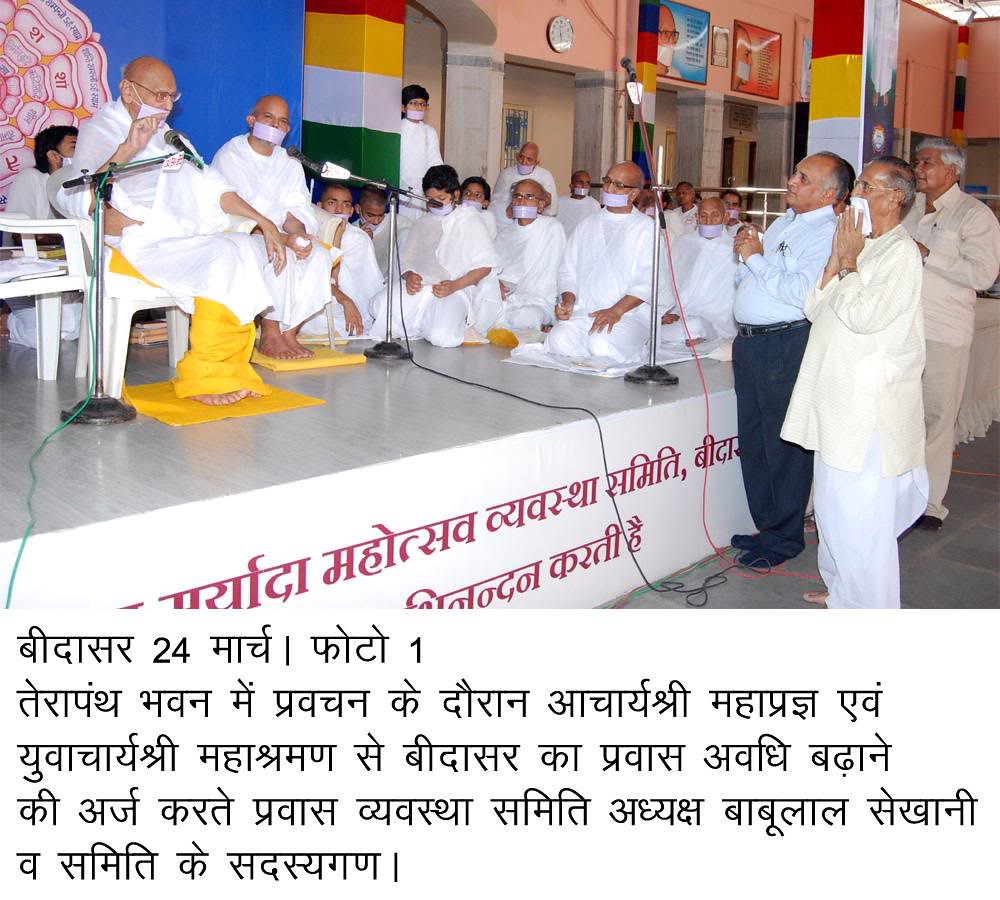| Book: | Thesis - The Jain Doctrine of Karma and the Science of Genetics
|
| Author: | Dr. Sohan Raj Tater
|
Honorary Advisor - Jain Vishva Bharati University, Ladnun (Rajasthan) | |
Honorary Convener - Parmarthik Shikshan Sanstha, Ladnun (Rajasthan) | |
Occasion: | On the basis of the above thesis, the author was awarded Ph.D. by Jain Vishva Bharati University, Ladnun (Rajasthan) |
A book based on this thesis is published. | |
Reviewer: | Digambara Jain Acārya Honourable Kanakanandiji.
|
The degree of Ph.D. being awarded on 'The Jain Doctrine of Karma and the Science of the Genetics', a unique work containing the modern scientific ideas, that is beneficial not only to Dr. Sohan Raj Tater himself but to the whole world, it is useful, benevolent, glorious and exemplary not only to him but also to every research scholar, the whole of the Jain community and to the people of the whole world. By quoting some important sentences of Dr. Sohan Raj Tater, I am making this humble endeavour to prove from his theoretical expatiation how different, subtle, broad, great, spiritual and benevolent to the world his thesis is from the other works of physical research.
"I have tried my level best to compare karma with different genes situated on DNA of a chromosome taking in consideration characteristics of both karma and genes. I have come to the conclusion that karmas are the cause and the genes their effect (fruits). Karma is a component of the subtlest body i.e. Karma Śarīa and gene is a component of the gross body. I came to the conclusion that karmas possibly play their roles in the gross body of the living organism with the help of genes. I have tried my level best to bring spirituality as close to science as possible."
The expatiation of the above topics is as given below:
By disposition, in a natural way, the form of a being is abstract, non-physical, containing all the knowledge and the elements of science. But in its worldly state it appears to be having a form and defiled by the vices like attachment, jealousy and malice. What is the cause of this contradiction? It is but natural that queries like this arise in one's mind. Giving its solution, Pujyapāda Swāmī says in his book 'Siddha bhakti', "astyātmānādibaddha - the worldly being has been bound in the bonds of karma since time immemorial." Hence from the point of view of relation of the karma with matter, the worldly being has a form in respect of mode. Explaining it, Sṛimaddevasena Swāmī says in the book 'Ālāpa Paddhati' -
jīvasyāpyasadtayavahāreṇa mūrtasvabhāvaḥ||164||
from non-substantive practice standpoint, the worldly being, adhered with mode, has got a form.
That is why, explaining the cause of the world, Kundakunda Swāmī says in his book 'Pravacansāra' says -
tammā du-natthi koī saṁhāvasavatthidotti saṁsāre|
saṁsāro puṇa kiriyā saṁsāramāṇassa davvassa||120||
In this world, therefore is nothing as such - absolutely established in its nature, after all mundance existence is (only) an activity of the soul-substance which is moving in four grades of existence.
The fact is that inspite of being immutable from the point of view of being substantial, the being is disordered from the point of view of mode. It seems from this that nothing in this world is fixed by nature i.e. nothing in this world remains in the same form, unmoving and here (in this world), the world is the cause in the unsteadiness that is there as the creatures (man etc.) living in the world have the modism in them, because the form of the world is like that. Now the result that is obtained by the matter from abandoning the earlier stage and receiving the latter stage is the form of the world.
In spite of being similar from the point of view of matter and birth, the being appear to be different. Describing its cause, Mahaprajña Vīrasena Swāmī, the omniscient in this fourth and last eon of creation, says in the book 'Dhawalā' -
"ṇa ca kārṇenaviṇā kajjāṇa muppattī ātthi. ………..tato kajjamettāṇi ceva kammāṇi vi ātthitiṇi cchayo kāyavyo jadi avaṁ to bhamara mahuvara kayaṁvādi saṇṇidehi vi ṇāmakammehi hodavvāmidi ṇa asa doso icchijjamāṇādo"
There can be no effect (result) without a cause. Hence, one must ascertain that there are as many karmas (in the form of causes) as are there the effects (in the form of earth, tejus and water etc.).
Question: If it is so, then beings having the names like 'Madhukar' and 'Kadamba' etc. should also be the effect of physique making karma.
Answer: This is not a defect because it is desired of the thing.
Akalaṁka Devaswāmī, the great logician explains this theory of karma in the following way -
loke hariśārdūla vrkabhujaṅgādayo nisargataḥ kraurya śoyahirādisaṁ pratipattauḥ|
vartante ityucyante na cāsāvākasmikī karmānimittatvāta||
On this earth lion, wolf, tiger and snake etc. are said to be natural even though they have the traits of bravery and cruelty without listening to any sermon, but they are not accidental as they are born on the rise of their karmas.
It is clear from the above examples that by reason of karma, this being gets to defiled consequences and suffers great hardships in hellish conditions -
kammaī diḍhaghaṇa cikkaṇaī garūvaī vajja samāī|
ṇāṇa viyakkhaṇu jīvadada uppāhi pādahi taī||
Karma that leads the soul that has infinite knowledge and strength and is god-like, to the wrong path, is very strong; not destroyed easily, is very smooth, and hard like a thunder bolt and heavy and is, therefore, impregnable and impenetrable.
Ācārya Bhatta Akalankadeva swāmī explaining the basic cause of the world, says in the scripture 'Rajavārtika' -
tatdātmanoasvatantṛīkarṇe mūlakāraṇama|
That (karma) is the root cause in making the soul dependent.
Ācārya Pūjyapāda swāmī says in 'Iṣatopadeśa' -
mohane saṁvrataṁ jñānaṁ svabhāva labhate na hi|
mataḥ pumānpadārthanaṁ ythā madankodravaiḥ||
Overcome by the liquor of deluding karma, the being doesn't know and attain its true from that has infinite knowledge just as one loses all self-control and the knowledge of good and bad, getting drunk by consuming intoxicating coarse grain.
Having overcome by physical karmas, the supreme soul, that possesses infinite knowledge, has been roaming in vain like a beggar since time immemorial. Thinking from an objective point of view, we find that the being has infinite power but being under the influence of karma, this infinite power doesn't get manifestation. Being unexpressed and indistinct, it exists in the being dormant and only as a possibility. Hence, thinking from modal point of view, we find that because of the worldly being, being subordinate to karma since time immemorial, it gets very weak and karma gets very powerful. That is why the being has been roaming in the world since time immemorial and the struggle between the being and karma goes on.
katthavi valio jīvo katthvi kammāī huṁti valiyāiṁ|
jīvassa ya kammasa ya puvvaviruddhāiṁ vairāiṁ||
Quoted from the commentary on Iṣṭopadeśa. At times the being gets strong and at other time karma gets strong. Thus the enmity and conflict between the being and karma has been going on since time immemorial.
ṇāṇā jīvā ṇāṇā kammaṁ ṇāṇāvihaṁ haveladdhī|
There are several beings, several kinds of karma and several attainments, depending on the karma.
kammeṇa viṇā udayaṁ jīvassaṇā vijjade uvasamaṁ vā|
khaiyaṁ khaovasamiya tamhā bhāvaṁ tu kammakadaṁ||58||
Without karma, the being does not get fruition - subsidence and destruction-cum-subsidence i.e. without physical karmas, the being does not get the four feelings of corporeal gross activity. That is why destructional, destructional-cum-subsidential, corporeal or subsidential volitions are said to be caused by karma.
There are innumerable beings in the universe. Their different bodies, senses, minds, vitality and longevity, get different forms from one-celled beings to five-sensed ones and from human beings to deities in accordance with the degree of attachment and jealousy and malice. They also get joys and sorrows accordingly. Along with the order of evolution and because of the good deeds done by the beings, karma is all-pervasive and extremely important in all the three words and in all the three periods of time and can be a cause in one's being a Tīrthaṁkara and attaining salvation.
Fruits of good deeds (merits)
punatyātmānaṁ pūyateaneneti yā puṇyama|
That which purifies soul or by which soul gets purified is good deed (merit). Vīrasena swāmī says in the book 'Dhawala Siddhānta Śāstra' -
Question: What are the fruits of merit?
Answer: Tīrthaṁkaras, pontiffs, saints, rulers of vast empires, Baladeva, Vāsudeva, and the attainments of deities and Vidyādharas are the fruits of merit.
Fruits of sin (demerit)
'pāti rakṣatiātmānaṁ śubhāditi pāpam'
(Chapter-6, Sarvārtha siddhi)
That which hinders soul from what is auspicious and good is sin (demerit).
Question: What are the fruits of sin?
Answer: Getting birth as hellish being and animals and plants and had persons, old age, death, disease, agony and poverty are the fruits of sin.
(Dhawalā, Book-1, p. 105)
How one can become a supreme soul
The measure of getting liberated forever in totality from all the karmas -
The being is basically good and pure, but because of the attitude and behaviour that is contrary to that goodness and pure form, it gets bound by the bonds of karma and has been roaming in this four-fold world, getting birth in 84 lacs of life, suffering all sorts of pain - physical, mental and spiritual - but if it (the being) observes non-violence in its pure form, equanimity, and detachment etc. resorting to suitable substance, area, period, birth and volition, it will get liberated from all the bonds of karma and become the supreme soul, personifying all the three blessings - truth, consciousness and bliss as -
śubhāśubhe puṇyāpuṇye sukha duḥkhe ca ṣata tryama|
hitmādhyaamnuṣtheyaṁ śeṣa trayamathāhitama||29a||
Auspicious and inauspicious, merit and demerit and joy and sorrow - all these come to six. The first three of them - auspicious, merit and joy - are fit to be observed as they are beneficial to soul. The rest of the three - inauspicious, demerit and sorrow should be abandoned as they are non-beneficial to soul. By performing good deeds like worshipping and respecting Jin and other saints, one gets the bondage of good karmas and when this good gets fruition, the being gets joy and happiness. On the contrary, inauspicious deeds like violence and telling lies etc. cause the bondage of demerit and on the fruition of that evil deed, one gets sorrow. Hence, of the six, the first three - auspicious deeds, merit and joy - are beneficial and the rest of the three - inauspicious deeds, demerits and sorrow - are deplorable.
ttrāpyādyaṁparityājyaṁ śeṣau na staḥ svayam|
śubhaṁ ca śuddhe vyaktvānte prapnoti parama padam||240||
The first auspicious deed - of the three activities cited in the above śloka, that have been said to be beneficial is fit to be abandoned. By doing so, the rest of the two - merit and joy - will automatically cease to be. Thus, by abandoning auspicious deed and by resorting to its pure form, the being ultimately attains salvation.
By researching such a great principle in the perspective of modern science, Dr. Sohan Raj Tater has churned the ocean of the world and filled the pot of research with the nector of knowledge. I wish Dr. Tater to drink this nector himself and attain salvation. I would like him to make this pot of nector available to me too, so that I too may attain salvation. I wish all the people of the world to go through this thesis and drink this nector so that all of them may be benefited and attain liberation.
With all my good wishes and blessings.
Ācārya Kanakanandi
Ga. Ph. Kā. Sāgawarā (Raj.)
23-11-2007
 Acharya Kanakanandi
Acharya Kanakanandi

